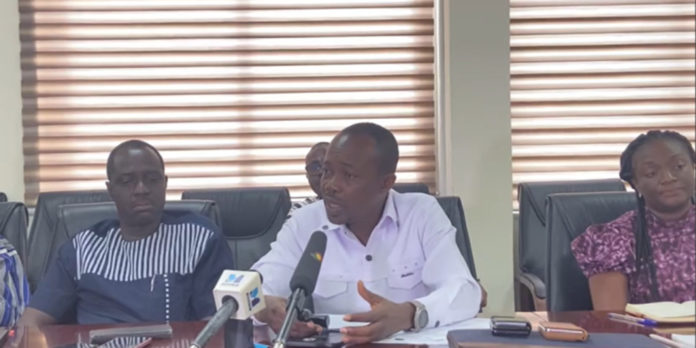The Fair Wages and Salaries Commission (FWSC) has recovered GH₵348 million from fraudulent entries on the public payroll.
This follows a nationwide audit aimed at removing unauthorized names from the payroll.
Speaking to JoyNews, the Chief Executive Officer of the FWSC, Benjamin Arthur, stated that a recommendation had been made to the Attorney-General for the prosecution of individuals involved in siphoning public funds.
“The whistleblowers have been very helpful. Issues that could not come to the attention of Fair Wages, we were able to address through the whistleblowers,” he said.
“What has happened now is that more people are becoming aware that someone is monitoring them.”
Mr. Arthur noted that the savings are substantial.
“The last estimate, done in August, was about GH₵348 million. Of course, there are also people who were entitled to certain benefits they weren’t receiving, and through payroll monitoring, we were able to detect those.”
Responding to the number of people removed from the payroll, Mr. Arthur stated, “For the institutions where we detected some—let’s call them anomalies, as I can’t judge intent—we’ve sent their names and details to management for further action. It’s only if management fails to act that we consider reporting to other authorities.”
“Unfortunately, we don’t have prosecutorial powers, so we can’t take legal action ourselves,” he said.
When asked if he is confident that the payroll will be cleared of unauthorized names in the coming weeks, months, or years, the FWSC CEO said, “It will be, and beyond that, it’s not just about illegal names. If you’re inactive and no one knows where you are, you will be deactivated.”
Meanwhile, after nearly two decades of implementing the current salary structure, the FWSC has announced that a review is underway to link productivity to pay.
“One of the areas that we have been very keen on and are also very optimistic about is the ability to have strong measures to link pay to productivity,” he said. “The President ordered that the Fair Wages and Public Services Commission should work together to ensure that this comes to fruition.”
Mr. Arthur noted that there is a national committee and a technical committee set up, and they have completed their work and produced reports on the implementation of the policy.
“We’ve also ensured that the Public Services Commission reviewed its manual to incorporate performance-based pay measures.”
“The engagement is ongoing, and once finalized, it will be presented to public sector workers for broader discussions. If this approach is accepted as the way forward, we’re prepared to implement it.”
Mr. Arthur further said that a digital platform is being developed to help organizations align their goals with national goals.
“Not only will the heads of institutions have contracts with specified outputs linked to organizational and national objectives, but this alignment will also extend down to every individual within the organization,” he added.
READ ALSO:

